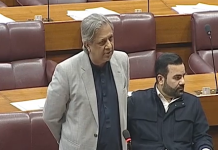
Khan Abdul Ghaffar Khan
Pakistan political atmosphere is tense owing to treasury’s unholy haste in introducing the amendments to various articles of the constitution of Pakistan 1973 dealing with the original jurisdiction of the supreme court of Pakistan. The proposed amendments that have failed to pass in the maiden move attempts to bring about systemic judicial reforms by thwarting the jurisdiction of Supreme Court inmatters envisaged under constitutional remits. This article will examine the background of the government’s move and entail critical reasons for why the government’s intended plan appears to be a calculated move towards authoritarianism.
Before adverting to the proposed judicial package, it is imperative to take stock of the poignancy of background that has given rise to the furry between Judiciary and the executive branches of the state. Since former Prime minister’s ouster from power and the emanating contentions regarding interpretation of article 63A that widely impacted the legitimacy of government in the province of Punjab. The PDM-led government have been trying to clip the feathers of the Supreme Court especially that of the Chief Justice who previously enjoyed unbridled discretion in the matters of fixation of cases and institution of benches. In this regard, the parliament passed a (Practice and Procedure Bill 2023) to divest the Chief Justice of his powers in the aforementioned domains mainly to shun the formation of benches with like-minded judges whose outcome has become predicable in the highly-polarized political atmosphere. Upon doing so, the government since then has faced another challenge when the supreme court apparently ruled in favor of the PTI, first by declaring civilian trial by military court as unconstitutional and second when recently, the court allowed the PTI to claim their due representation in the reserve quota of the national assembly. The so-called leanings of the majority judges of the Supreme Court has been sending signals that the upcoming chief justice may quash the list of impending cases instituted against the chairman of Pakistan Tehreek-e-Insaf. Something that would only be troubling for the government but also for the powers that-be.
Moving on further, there are two main issues arising out therefrom; one how will the Federal Constitutional Court impact the administration of justice in Pakistan? Second, if the government’s main objective improving the dispensing of Justice then why not the reforms are being carried out in the dysfunctional areas of lower courts and of that in high courts that entertain majority of criminal and civil backlog?
Adverting to the issues so raised, it can be said without any exhaustive inquisition that reforms for the sake of improvement of Justice is certainly not the purpose intended here. It is but the political leverage the current government is striving to achieve by clipping the wings of the Supreme Court. The proposed federal constitutional court will consist of 5 judges who would be directly appointed by the president on the advice of Prime Minister that will be furnished upon recommendation of the parliamentary committee. Further the retiring age of FCC judges will be extended to 68 years providing an incentive for the Supreme Court or high court judges to stay in line with the executive policy. This if happens, will significantly hamper the judicial independence, as the Pakistan’s chequered history is replete with marks of exploitations and politically motivated judges. Moreover, the proposed number of judges being 5 would mean that only a majority of 3 judges would decide the fate of the constitutional matter as opposed to the full court of Supreme Court sitting with 17 members. The latter ensures more diversity, inclusivity and impartiality that would not be possible with five judges or anywhere near that figure.
By the enactment of the Federal Constitutional Court the constitutional lis will cease before the Supreme Court, as it will then function as court of appeal in civil, criminal and other ancillary matters barring the constitutional petitions that instead lie before the federal constitutional court.
If the government had wanted to improve the scales of justice and functionality of courts, it could have begun with the lower courts. According to the bi-annual report of the judicial statistics, there are about 2.26 million cases in pendens before the courts in Pakistan. The most abused area of law is clauses of Cr.PC and CPC (Procedure Law) that makes out for delay. This possibility of seeking adjournment on cogent grounds have turned into a judicial practice equally uphold by the judges and the advocates who appear to be in complete neglect of the vows of litigants toiling in courts for disposal of their mundane affairs with heavy legal costs. The chronicles bears out the adversaries that litigants have to face who have now growndisenchanted with the legal system,as the proposed amendments do not tend to serve any remedy in this regard and therefore are only a political façade and nothing beyond that.
Having sufficiently dilated on the convoluted intentions of the legislature, it can be reasonably deduced that the federal constitutional court, that is otherwise an amenable course towards the timely disposal of constitutional matters in countries such as South Africa, Uzbekistan, Ukraine, Thailand, Zimbabwe interalia others jurisdictions. But its application is Pakistan where political patronage is the ultimately qualification for a high post will only result in servitude of impartial judiciary and hence destructive for the notion of rule of law as the preambular value of the constitution in effect.
The writer is a lawyer and Chairperson of Legislation Pakistan Org.

























